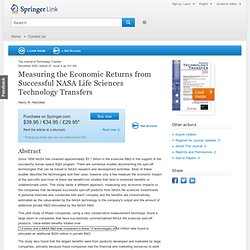

The Journal of Technology Transfer, Volume 27, Number 4. Since 1958 NASA has invested approximately $3.7 billion in life sciences R&D in the support of the successful human space flight program.

There are numerous studies documenting the spin-off technologies that can be traced to NASA research and development activities. Most of these studies describe the technologies and their uses; however only a few measure the economic impact of the spin-offs and most of these are benefit/cost studies that tend to overstate benefits or underestimate costs. This study takes a different approach, measuring only economic impacts to the companies that developed successful spin-off products from NASA life sciences investments.
In Defense of Space Exploration. Matt Silver While many in the MIT community are likely thrilled by President’s Bush’s newly announced initiative to return men to the moon, others remain more skeptical. Echoing arguments voiced this week by Democratic hopefuls in New Hampshire, some cynically suggest that, among other things, the plan is an election-year gesture, it will cost too much money, our national resources and attention should be focused on other areas (such as health-care), and that, in short, the gains from human space exploration are really not worth the effort. While such rhetoric may sound good on a campaign platform, it ignores the details of the initiative and overlooks both the tangible and intangible benefits that exploration provides.
Let’s take a moment to review both the plan and benefits of space exploration in general. First, is this an election-year stunt? Regarding cost, let’s put some things in perspective. First, money spent on space research and development does not disappear into thin air. Space exploration. Saturn V rocket, used for the American manned lunar landing missions The Moon as seen in a digitally processed image from data collected during a spacecraft flyby While the observation of objects in space, known as astronomy, predates reliable recorded history, it was the development of large and relatively efficient rockets during the early 20th century that allowed physical space exploration to become a reality.
Common rationales for exploring space include advancing scientific research, uniting different nations, ensuring the future survival of humanity and developing military and strategic advantages against other countries. Space exploration has often been used as a proxy competition for geopolitical rivalries such as the Cold War. Is Space Exploration Worth the Cost? A Freakonomics Quorum. Warning: what follows is a long blog post, perhaps better suited for a newspaper or magazine, and it will at times require your close attention.

But I believe it is easily one of the best quorums we’ve ever published here. I’d like to thank all the participants for their thoughtful, well-considered, and fascinating answers, and for taking the time to share their very considerable expertise and experience. Pretend that instead of being responsible for your household budget, which means paying for rent or a mortgage, transportation, some schooling costs, groceries, healthcare, vacation, etc., you are instead responsible for a considerably larger budget that provides a variety of services for about 300 million people including the maintenance of an army, protecting the borders, etc.
In other words, pretend you are responsible for the U.S. Federal budget. We gathered up a group of space authorities — G. Is manned space exploration worth the cost? Their responses are below. G. Why explore? Lithium Battery Power Delivers Electric Vehicles to Market. Originating Technology/NASA Contribution As increased energy efficiency, and particularly fuel efficiency, becomes a greater concern, hybrid and electric vehicles gain greater prominence in the market. Electric vehicles (EVs), in particular, provide an attractive option as they produce no emissions during operation, isolating any potential emissions and effluents in the manufacturing and energy-generation streams. The necessary energy stores to support a shift to EVs already exist, as utilities constructed to address peak demands have off-peak surpluses sufficient to charge about 180 million plug-in hybrid or all-electric cars.
According to a report from the U.S. Department of Energy’s Pacific Northwest National Laboratory, there is enough excess generating capacity during the night and morning to allow more than 80 percent of today’s vehicles to make the average daily commute solely using this electricity. Partnership Product Outcome. Benefits of Space Exploration.
The US Space Program Benefits. The US Space program has usually been less than 1% of the US Budget. However it provides countless benefits in space exploration, improvement of life technologies, greening of the planet and changing of lives for better stewardship of the planet. This article and others in this section are provided to teach an awareness of why the US space program is so important, what lessons we can all learn and how we can apply them to our own lives. One of the burning questions that has been the same for the last 40+ years is: "Why go into space when we have so many problems here on Earth? " That is a fair question, and worth answering. 1. 2. 3. 4. Not only is it fun to learn new things that can help us grow as a species, it is a core need of the human race to explore.
What are the benefits of space exploration.